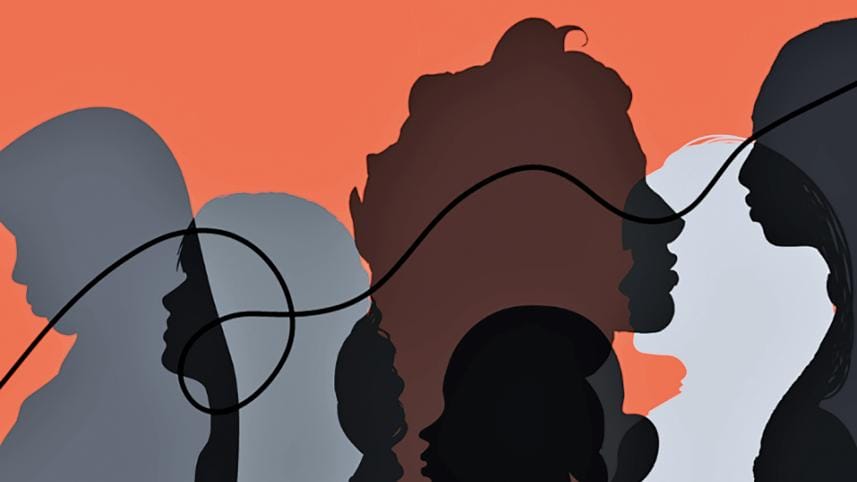A comprehensive legal approach to the crime of rape

A recent report from the Manabadhikar Shongskriti Foundation (MSF) \ has highlighted that in February 2025, there were 295 recorded incidents of violence against women and children in Bangladesh. The high number of cases, especially involving children, indicates a deepening crisis of sexual violence in Bangladesh.
Despite the staggering number of reported incidents, the justice system's response has been critically insufficient. Convictions for such crimes remain exceptionally low, casting doubt on the efficacy of the legal framework in addressing violence against women and children. According to data from the Dhaka Metropolitan Police, only 24 perpetrators have been convicted in the past five years for such crimes, a number that is alarmingly small given the scope of the problem. This highlights systemic failures in the legal system, ranging from delayed and flawed investigations and inadequate evidence collection to societal factors such as victim-blaming and a lack of proper support for survivors.
In Bangladesh, the legal framework surrounding rape is primarily governed by the Women and Children Repression Prevention Act 2000 (WCRPA), which was significantly amended in 2020 to impose more stringent punishments, including life imprisonment or the death penalty for perpetrators of rape. Section 9 of the Act lays down the punishment for rape, with a particular focus on cases involving gang rape, custodial rape, or death of the victim. This Act is complemented by the Penal Code 1860, which provides the definition of rape under section 375, classifying it as sexual intercourse without consent, against a woman's will or by putting her in fear of death or hurt.
Improving forensic and medical evidence collection is vital to securing successful convictions. Bangladesh should invest in state-of-the-art forensic labs and ensure that medical professionals receive specialised training in handling evidence related to sexual violence.
The Evidence Act 1872, infamously allowed questioning a victim's past sexual history, often to discredit their testimony. However, a significant reform in 2022 removed section 155(4), which used to permit such questioning, protecting the dignity of survivors and ensuring a fairer trial. Despite these comprehensive legal provisions, the implementation of rape laws faces persistent challenges in Bangladesh, which include, delays in investigations and trials, poor evidence collection, and finally leading to low conviction rates.
One of the most pressing issues is the delay in the judicial process. While the WCRPA mandates that rape trials should be completed within 180 days, in practice, many cases take years to reach a conclusion due to subsisting backlog, lack of resources, and procedural delays. This extended waiting period not only discourages survivors from pursuing legal action but also leaves them vulnerable to ongoing social stigma and victimisation. Witness intimidation also plays a significant role in undermining the trial process, as witnesses may be coerced into retracting their statements or withdrawing from testifying.
Moreover, dedicated police units trained in handling sexual violence cases would ensure that victims are treated with dignity and sensitivity from the moment a case is reported. Drawing inspiration from the UK's Independent Sexual Violence Advisors (ISVAs), Bangladesh could appoint professionals to support rape survivors in navigating the complexities, helping with the access to both psychosocial counseling and legal guidance. This would reduce the psychological burden on victims and ensure they do not feel isolated during the trial process.
Further, improving forensic and medical evidence collection is vital to securing successful convictions. Bangladesh should invest in state-of-the-art forensic labs and ensure that medical professionals receive specialised training in handling evidence related to sexual violence. In addition to legal reforms, social and cultural attitudes toward sexual violence must change. Victims often face social stigma, especially in rural communities where rape survivors are often blamed for the assault or pressured to settle the matter privately. To counter this, the government should implement nationwide public awareness campaigns focusing on gender equality, victim rights, and the importance of respectful relationships. Incorporating gender-based violence education into the school curriculum would also be an effective long-term strategy to prevent future occurrences of sexual violence. Public education should also emphasise consent, gender stereotypes, nature and punishment of sexual offences etc.
Additionally, establishing rape crisis centers across the country should offer comprehensive support to rape survivors, from medical care to legal assistance and psychological counseling. These centers would provide survivors with a safe space to report the crime, access legal help, and receive support without fear of discrimination or reprisal. Legal aid should be available to all survivors, particularly for those who cannot afford it, to ensure equitable access to justice.
Finally, addressing witness intimidation is crucial for ensuring that rape victims can safely testify. The government should establish a national witness protection program to safeguard the safety of victims and witnesses throughout the trial process. This would encourage more survivors to come forward and participate in legal proceedings without fear of retribution from the perpetrators.
By adopting these recommendations and drawing from successful international models, Bangladesh can strengthen its legal response to rape and improve victim support services, ensuring that survivors receive the justice they deserve and that perpetrators are held accountable.
The writer is research associate, The Lawyers & Jurists.



 For all latest news, follow The Daily Star's Google News channel.
For all latest news, follow The Daily Star's Google News channel.
Comments